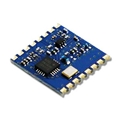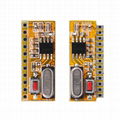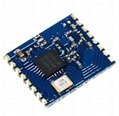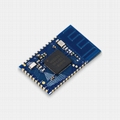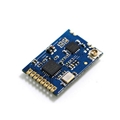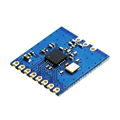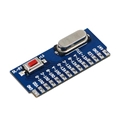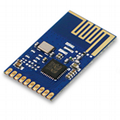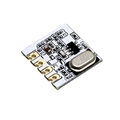| Model: | DL-LLCC68-S |
|---|---|
| Brand: | DreamLNK |
| Origin: | Made In China |
| Category: | Electronics & Electricity / Electronic Components / Circuit Board |
| Label: | LoRa module , RF module , LLCC68 LoRa Module |
| Min. Order: | 200 pc |
| Last Online:02 Sep, 2025 |
DL-LLCC68-S is a wireless module designed based on Semtech 's radio frequency chip LLCC68 . It mainly adopts a new generation of LoRa™ modulation technology for ultra long distance spread spectrum communication. This LoRa module is compact in size, and has the characteristics of ultra low receiving power consumption, strong anti interference ability, and longer transmission than traditional modulation methods. It can be widely used in various wireless communication fields of the Internet of Things.
DL-LLCC68-S RF module has high rece iving sensitivity of 129dB m@LoRa, ultra low receiving current and dormant current, the transmit power can be configured through software, and the maximum power can reach +22dBm. Compared with traditional modulation technology, LoRa™ modulation technology has obvious advantages in anti blocking and selection, which solves the problem of distance, anti interference and power consumption that traditional design schemes cannot take into account at the same time.
Advantages of this LoRa Core™ LLCC68 RF module:
* LLCC68 RF module supports both LoRa and FSK modes
* Compared with traditional small wireless products, the FSK mode of LLCC68 is more sensitive
* The LORa mode of LLCC68 supports better performance and Solutions
* The most important is: the supply of LLCC68 chips is more stable than other LoRa chips.
Features:
* Supports FSK, GFSK, MSK, GMSK and LoRa™ modulation mode;
* Frequency range: 433Mhz, 868Mhz, 915Mhz optional
* Maximum 151dB link budget
* The operating voltage is 3.3V, the maximum output transmission power is + 22dBm, and the maximum operating current is 130mA.
* The receiving state has the characteristics of low power consumption, with a minimum receiving current of 4.5mA, and a standby current of 0.6mA.
* Integrated DC-DC Converter and LDO
* Programmable bit rates from 1.76 Kbps to 62.5 kbps @ LoRa, and 300 kbps @ FSK
* High sensitivity-129dBm@LoRa;
* Anti-jamming capability of 88dB @ 1MHz frequency deviation
* Co-channel supperssion of 19dB in LoRa Mode
* Built-in bit synchronizer for clock recovery
* Ultra fast automatic Channel Activity Detection (CAD)
* Supported bandwidth: 125kHz, 250kHz, 500kHz
BW = 125kHz supports SF5-SF9
BW = 250kHz supports SF5-SF10
BW = 500kHz supports SF5-SF11
Technical Parameter
|
Parameter |
Min. |
Typical |
Max. |
Unit |
Remarks |
|
Operating conditions |
|||||
|
Working voltage & IO voltage range |
1.8 |
3.3 |
3.7 |
V |
To ensure maximum chip power, stable voltage should ≥3.1V |
|
Working temperature range |
-40 |
25 |
85 |
℃ |
|
|
Current consumption |
|||||
|
Receiving current |
|
4.5 |
|
mA |
Adopts CAD working mode, Can effectively reduce the overall working current |
|
Transmission current @433MHz |
|
110 70 45 |
|
mA |
@433MHz @ DCDC +22dBm +20dBm +17dbm |
|
Transmission current @868MHz @915MHz |
|
122 105 98 |
|
mA |
@868MHz @915MHz @DCDC +22dBm +20dBm +17dbm |
|
Standby current |
|
0.6 |
|
uA |
Save by register |
|
RF parameters |
|||||
|
Recommended Frequency (Ensure best performance) |
300 |
433/470 |
510 |
MHz |
@433MHz/470Mhz RF module |
|
800 |
868/915 |
960 |
MHz |
@868MHz/915Mhz RF module |
|
|
Transmit power range |
-9 |
22 |
22 |
dBm |
Table 13-40 in Data Sheet: SetTxParams SPI Transaction |
|
LoRa Receiving sensitivity |
|
-129 |
|
dBm |
@BW =250KH, SF=10, CR =4/5 |
|
FSK Receiving sensitivity |
|
-125 |
|
dBm |
@BR_F = 0.6 kb/s, FDA = 0.8 kHz, BW_F = 4 kHz |
|
FSK Rate range |
0.6 |
|
300 |
Kb/s |
|
|
LoRa Rate range |
1.76 |
|
62.5 |
Kb/s |
Min. for SF9, BW_L = 125 kHz Max. for SF5, BW_L = 500 kHz |
Typical application:
Based on LoRa Core™ LLCC68 chip, this DL-LLCC68-S RF Module can meet a variety of wireless transmission needs in the market. Such as below applications:
* Existing FSK wireless communication
* LoRa-based smart home applications
* Industrial control scenarios that require anti-jamming, remote and real-time performance
* The original LoRa applications doesn't need ultra-distant scenes
